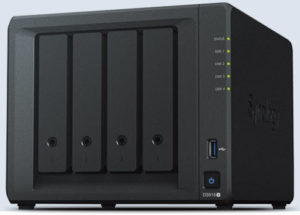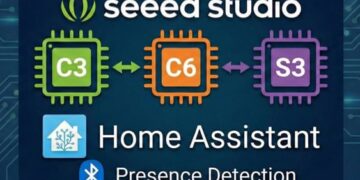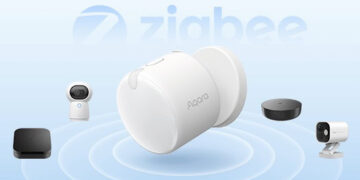Years ago I had a QNAP NAS which I used for my VMware home lab, but it was aging and I wanted something new and larger for all of my data and photos. Now, in 2019, I selected the Synology DS918+ NAS. Find out the specs, how I configured it, and what disks/memory/UPS I used. A future blog post will go into the software configuration and more details about my Docker containers, VPN, VM, cloud backup, etc.
Synology DS918+ Selection
Synology has a large portfolio of NAS devices. Some are aimed at basic home use, others at IT enthusiasts, and some at small businesses. I don't have a large amount of data at home (~3TB), so I didn't need a big and expensive NAS. But I did want one with a full x64 Intel processor (vs. ARM on their budget models), quad cores, and 4 HDD bays. So that narrowed down my choice to the DS918+. You can find the 4GB diskless model on Amazon for $549.
The basic specs for the DS918+ are:
- Quad Core 1.5GHz Intel Celeron processor with bursts to 2.3GHz
- AES-NI instructions for encryption offload
- H.265/H.264 4K video hardware transcode (2 streams)
- Dual 1Gb NICs
- 4GB RAM (expandable to 8GB)
- Dual NVME M.2 cache disks
- Front USB 3.0 port (for external storage)
- Rear USB 3.0 port (primarly for a UPS)
- 120-240v compatible
- 3-year warranty
The main competition with Synology is QNAP. I have an ancient QNAP NAS, which I used for years with my ESXi home lab. But after doing some research, I decided that DSM was more advanced than the QNAP OS, even though feature wise the QNAP hardware is more well rounded. After using my DS918+, I'm absolutely loving DSM and all of the features it has.
Also take note that it supports iSCSI, NFS, SMB and AFP. This means for folks with a VMware lab you can mount NFS or iSCSI volumes to your ESXi hosts. DSM also has VAAI offload built in, so VM copy/clone operations will be expedited.

Disk Selection
The base Synology unit does not come with any drives, so next up was drive selection. I narrowed down my choice to NAS specific HDDs, which cost more than consumer grade disks, but are more rugged and designed for 24x7x365 NAS use. The top two options I found were Western Digital (WD) Red Pro and Seagate Ironwolf Pro. Synology DSM has unique integration with Seagate Ironwolf Pro disks for health monitoring, so that was one factor that tipped me into buying two 8TB Seagate Ironwolf Pro drives from Amazon for $269 each. These will be used in a RAID-1 type configuration, so I'll have approximately 7.0TB usable space after formatting and DSM overhead. The disks have a 5 year warranty, and 2 year free data recovery warranty.
Finally, I wanted to use the NVMe cache feature of the DS918+ NAS. If you install two cache disks they will be configured in RAID-1 and serve as both a read and write cache. The M.2 slots are just PCIe GEN2, so that limits top speeds to approximately 500MB/s. So you don't need high end NVMe devices as the additional bandwidth and IOPS won't be utilized. I bit the bullet and got two Samsung 970 Pro 512GB M.2 sticks for $160 each on Amazon. These have a 5 year warranty as well. Smaller, slower, and cheaper options are certainly available (or go cache-less). For example, for $80 each you could get the Samsung 970 Evo Plus 256GB SSD.
I carefully reviewed the Synology Compatibility matrix to make sure all storage devices had been tested.
Memory
The base DS918+ comes with 4GB of RAM. That's plenty for just basic NAS functionality and a small Docker container or two. My DS918+ memory utilization was around 80% with a 1.5GB VM and one small Docker container. That was cutting it a bit too close for comfort, so I bought another 4GB. You can go with the pricey Synology branded RAM for $68, or the 4GB A-Tech version for $26.
UPS Selection
While totally optional, I think it's wise to buy a quality consumer grade UPS for your NAS. Why? It has caches that are volatile, and in my case I'll also be running a VM and docker containers. So I want it powered down gracefully in the case of a power outage. The last thing I wanted is a corrupted volume or lost data. The first name that came to mind was APC, but from my reading the quality of their products tanked after the buyout by Schneider electric. CyberPower was highly rated, so I checked out their line. I went with a true sinewave output UPS, as I wanted quality power going into my NAS, router, and ethernet switch. This led me to the Cyberpower CP1000PFCLCD 1000VA model, for $130.
Summary
I've been exceptionally happy with my Synology DS918+ purchase. I have two free bays for future expansion, blazing fast disk I/O, acceptable Windows VM performance, and a couple of Docker containers. Not to mention a dozen file shares, Apple TimeMachine backups, and more, all running on the NAS. Plus, it's all on a UPS protected against power failures. A great investment!
Next up in a follow-on blog post, Configuring Synology DSM, is the software configuration. In there I'll configure a Windows VM, Docker Container, setup a VPN, configure shares, snapshots, and backup data to the cloud. If you are an OpenVPN server fan, then check out my post How-to: Synology OpenVPN Server in a Docker Container.




